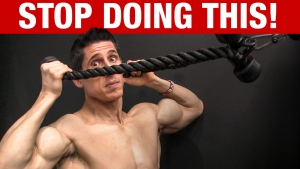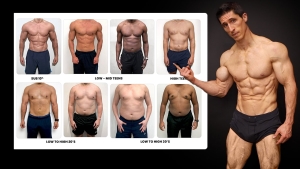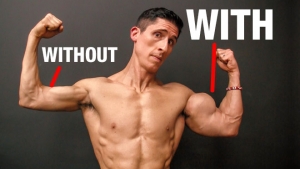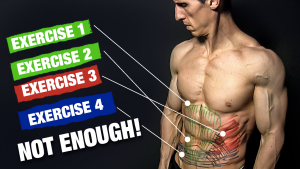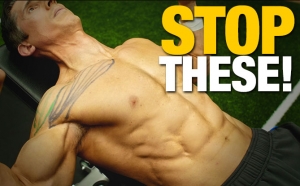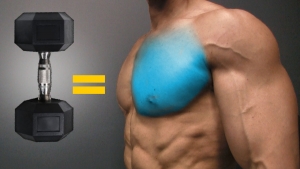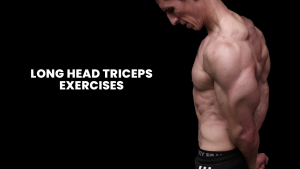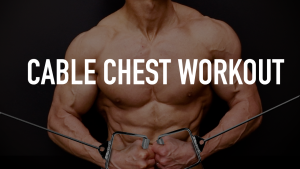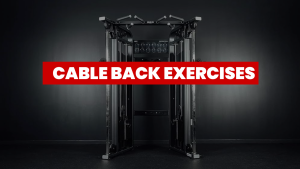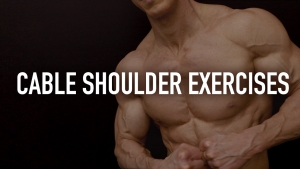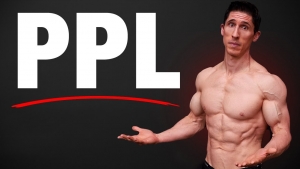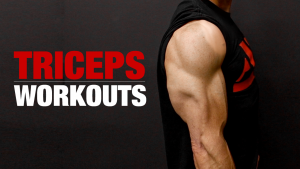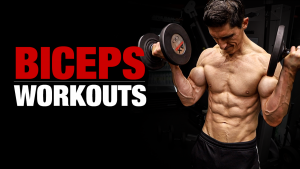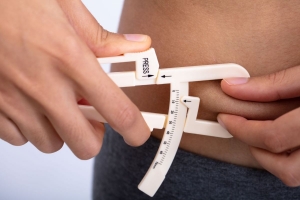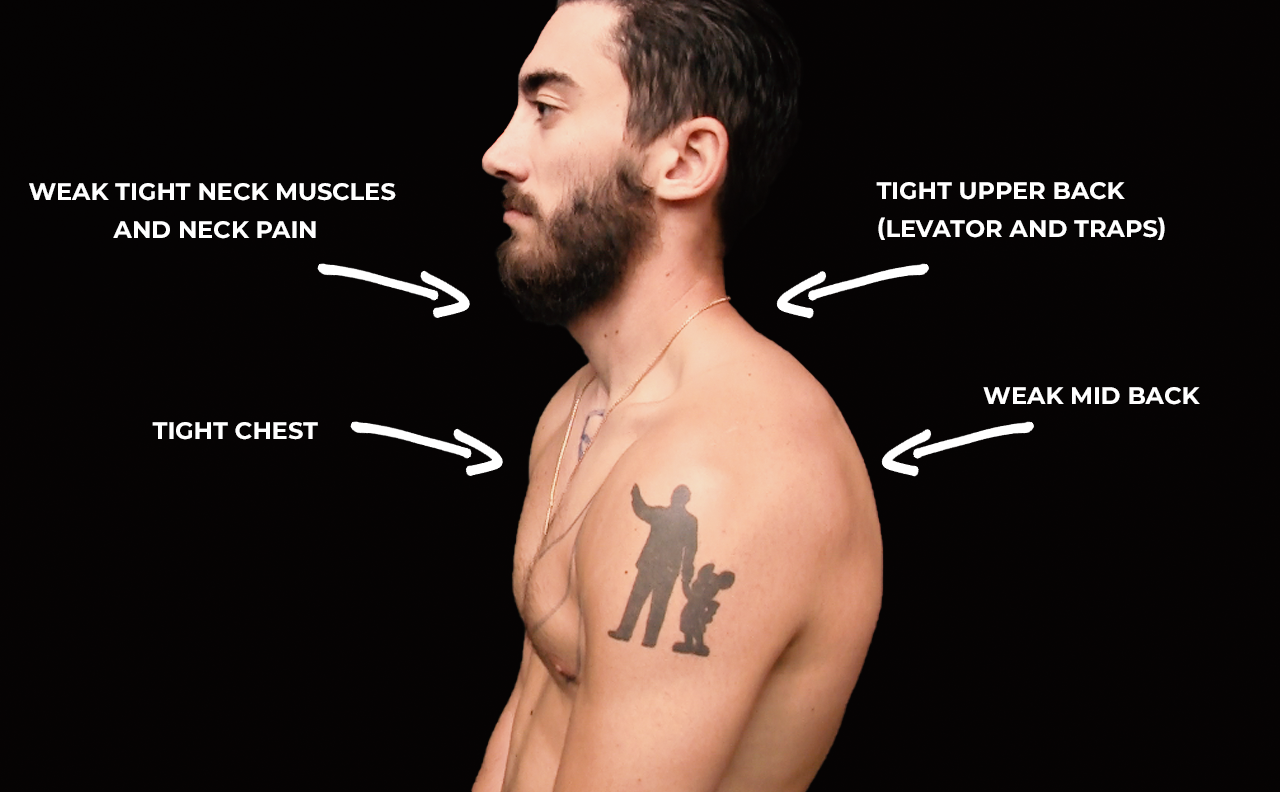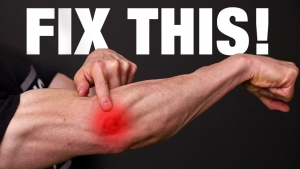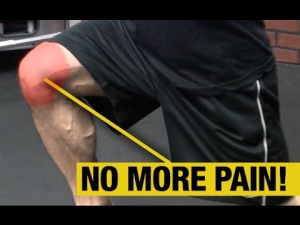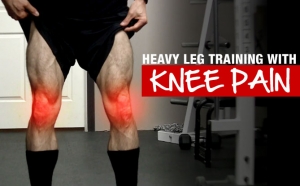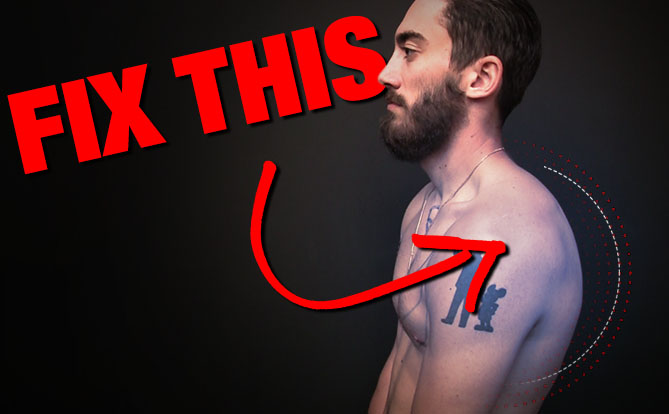
HOW TO FIX ROUNDED SHOULDERS
Rounded shoulders can screw up all of your hard work during training and activities.
Just like I don’t believe in building a house off a crappy foundation, I believe that you better have correct posture before you start training.
It’s why all of my workouts include corrective movements.
I want you to get the body you want, but not just for aesthetics. I want you to have a healthy and functional body. And it all starts with your posture.
There are four parts to fixing your bad posture, but I want to begin with one of the most common issues: rounded shoulders.
We’ll start by figuring out if you’ve been suffering from rounded shoulders. If you’ve been looking at your cell phone or working at a desk for periods of time, there’s a very good chance you have. Then we’ll look at joint fixes, stretches, exercises and habits to help you fix rounded shoulders.
DO YOU HAVE ROUNDED SHOULDERS?
There’s a quick way to figure out if you currently have a rounded shoulder position.
Just stand up right now and put your arms at your side.
Without doing anything I want you to just look down at the position of your thumbs. Stick them out – just extend your thumbs – and take note of the direction.

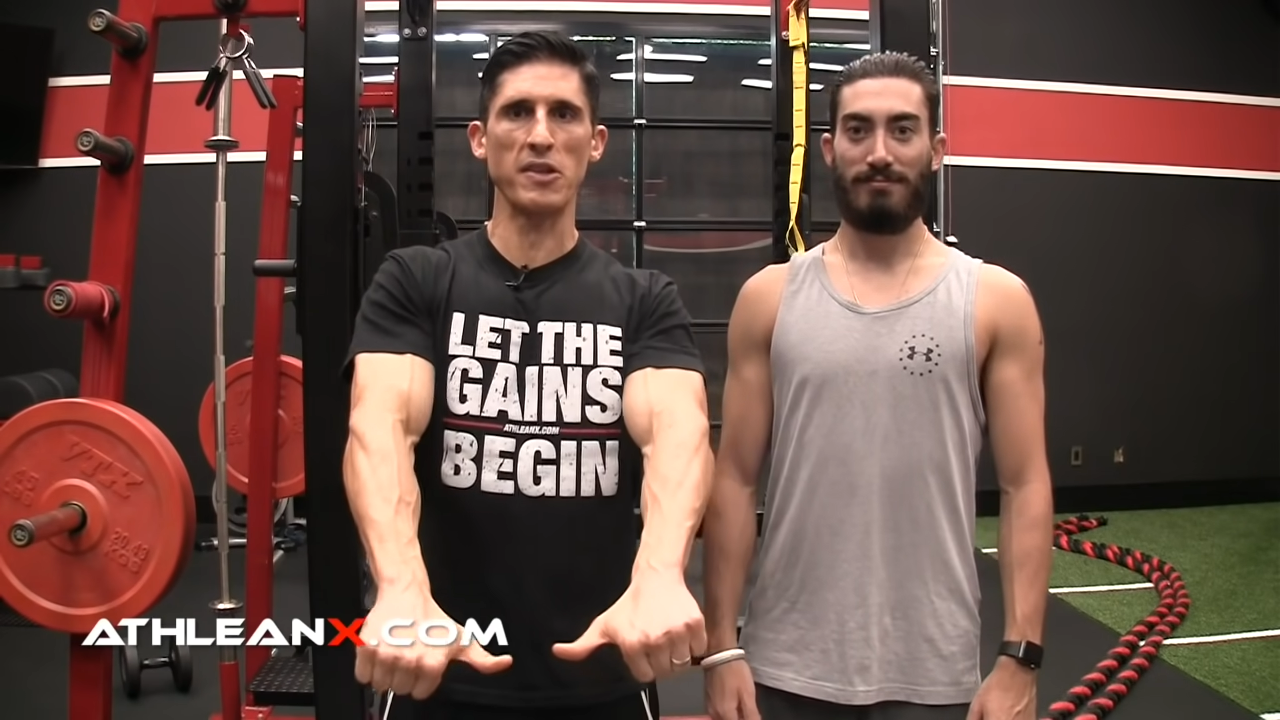
Are they pointing straight ahead or at least towards the front of the room?
If you find that your thumbs are pointing straight at each other – in other words, staying in a lateral position – then you might have an imbalance that is causing rounded shoulders.
Thumbs pointing toward each other happens because when you’re standing up, your shoulders are too rounded.
Now, do this same thing again, but look in the mirror to validate that.
I’m going to cover the four things you’re going to need to do to fix rounded shoulders:
- You’re going to need to work on your joints. This will help to reduce shoulder pain, if that’s a part of your rounded shoulders posture.
- You’re going to have to work on muscles. That means you’ll need to focus on weak muscles or underactive muscles, and the ones you need to strengthen.
- You’re going to focus on the muscles that are tight or overactive muscles; the ones you need stretch.
- You’re going to have to work on your habits.
Let’s kick it off with the joints!
HOW TO FIX ROUNDED SHOULDERS: JOINT FIX
As a physical therapist, I want to start with the joint itself to make sure we can help you get rid of those slumped shoulders and improve your shoulder flexibility.
When I say “joint,” you’re probably thinking that the shoulder muscles are what I’m talking about, right?
Ironically, it’s not.
The joint that you’re going to really want to focus on the most is your back.
More specifically, your mid-back, or the thoracic spine.

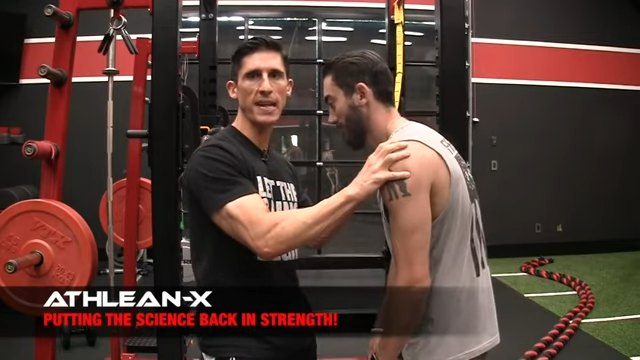
What happens is, this gets tight on most of us, and it causes a muscle imbalance in several areas. When the mid-back gets tight it starts to round out and it takes everything from your upper back to your chin with it. The head and the shoulders come with it, too.
But if we can get an extension through the thoracic spine, everything goes back into its correct position quickly.
Here are some gentle exercises you can do to fix the joint that’s causing your rounded shoulders.
SLEEPER STRETCH
I recommend the sleeper stretch. This will help to attack the shoulder itself, which might be making the head of the humerus skirt forward and be rounded.

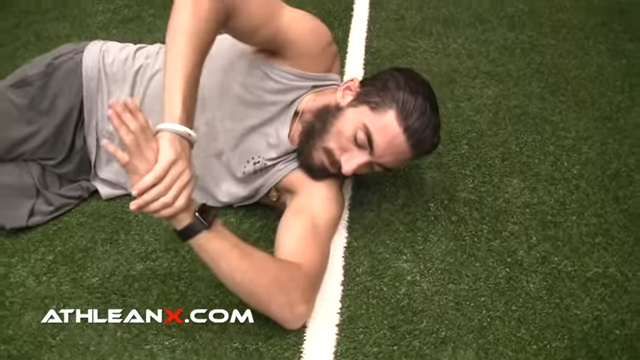
But more than likely it’s the mid thoracic spine that’s causing the shoulders to be rounded instead of the shoulder itself causing the problem.
Stretching out the chest can really help with this. First let me show you what I think is one of the most effective deep stretches for mobilization of the thoracic spine.
You’ll focus on opening up the chest region with side-to-side rolls.
ROLLING CHEST STRETCHES

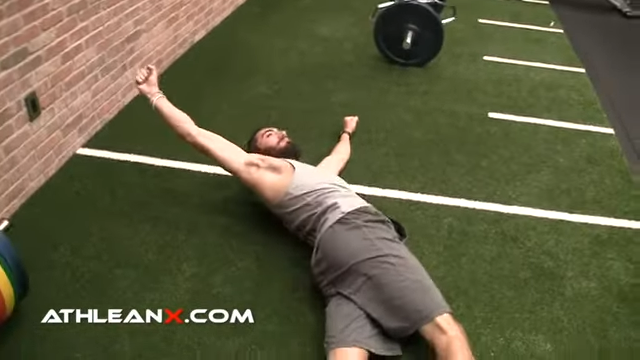
Simply put your arms up and over your head at about a 45-degree angle. This is the neutral position. As you rotate, keep your chest wide open. You’ll get the elevation of the arms overhead, but at the same time you’re getting an extension through the thoracic spine.
All you have to do is work on rolling from the left shoulder side to the right shoulder side.
Do this a few times each day at least four times a week, and you’ll start to see a huge difference.
STRETCHES TO FIX ROUNDED SHOULDERS
If we’re going to do some stretching, we first need to determine which are the tight muscles vs. which are the weak muscles.
When Jesse turns to the side with a rounded shoulders posture, you can see that the muscles in the front of his body are going to get tight, and the muscles in the back of the body are going to get weak.

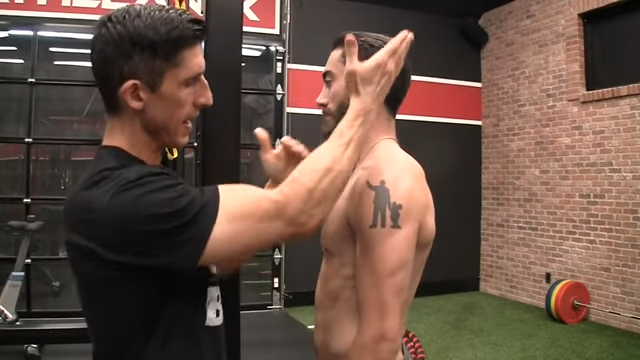
This is called ‘Upper Cross Syndrome’ because of the way that these two areas cross each other. When you have this type of dysfunction, you get tightness through the chest muscles and the muscles in the upper back: the levator and the traps.
At the same time, because the mid-back gets stretched out, you get weakness through a lot of the muscles surrounding the scapula. You also get weakness and tightness of the neck muscles. A lot of people with rounded shoulders also have neck pain.
We need to get into the correct shoulder position, and we can start by doing some stretching exercises for an extended period each day. A few seconds of holding the correct position for these exercises and then not doing them again for a week won’t work. You need to be consistent with these basic exercises and simple stretches.
When it comes to defining what you’re going to stretch, there are two main areas of focus: subscapularis and pec minor.
If you look at Jesse from the side again, you can see he has a lot of internal rotation of his arms. This is coming from the subscapularis, which is one of the four rotator cuff muscles. It’s the only one that causes shoulder internal rotation, as opposed to shoulder external rotation.
Then the other thing that can pull the shoulders forward is the pec minor.

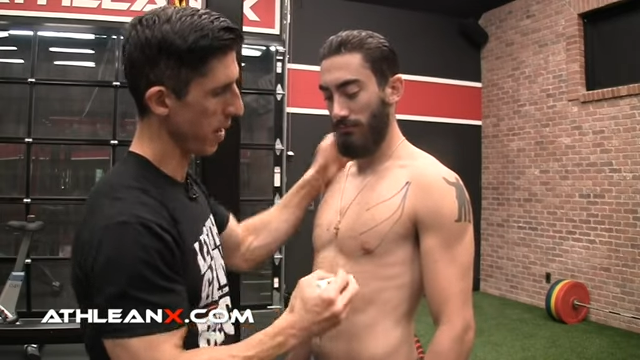
The pec minor comes from the side and it comes down connects to the ribs. If this area is tight it’s going to pull the shoulder forward.
We can address these issues by focusing on the subscapularis first.
The only equipment you’ll need is an exercise band and a doorway. A wall could also work for a wall stretch.
SUBSCAPULARIS STRETCH
To stretch this area, you’ve got to take your arm and get it into external rotation as much as you can.

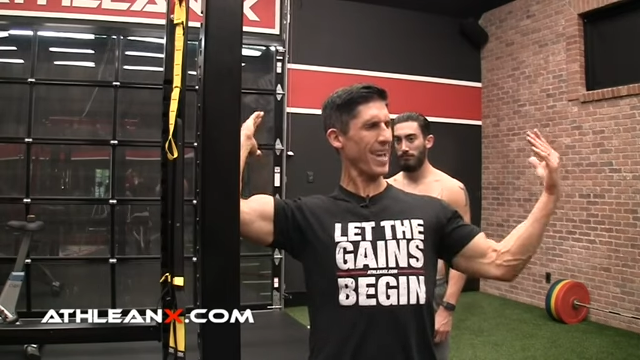
Get into an L-shaped arm position against the edge of a doorway.
Once it’s hooked there, you’re just going to rotate your chest away from the wall. Take a step forward so that your feet are staggered and as you stride out with the externally rotated arm, you’ll feel the stretch inside the armpit.
It should look like you’re getting ready to throw a baseball as a pitcher. You should hold that for about 30 seconds at a time.
Again, do this a few times a week. It’s going to really help to loosen it up.
PEC MINOR STRETCH
Now, for the pec minor. Adopting the same position of the arm, tilt forward against a doorframe in order to push the front of the shoulder back.
Next, pinch your shoulder blades together to get the mid-back activated. Finally, raise the arm up so that your upper body doesn’t start tilting downward.

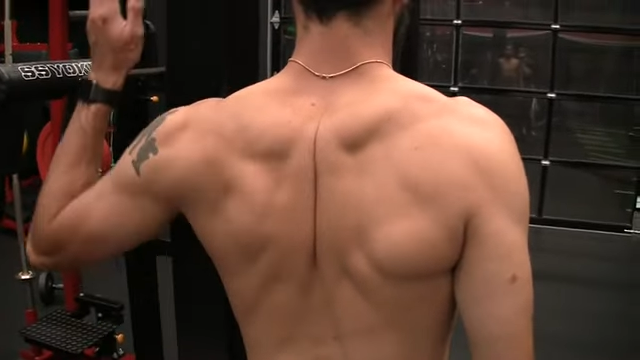
EXERCISES TO FIX ROUNDED SHOULDERS
Now we’ve got to strengthen the weak muscles.
If the internal rotators are tight, that means the external rotators are probably weak. If you can get the rotator cuff and the rhomboids to work, that would help.
If you can get the lower traps to work, that pull the shoulder blades back and set them down, nice and tall, then that would help too.
If you could also get the serratus anterior to work – which is a muscle that provides stability for the shoulder blade to keep it back – then that would be a well-rounded game plan.
I’ll show you two exercises that accomplish all of those things. All you need are a wall and a resistance band.
UPGRADED BAND PULL APART
The first exercise that I want you to do is a variation of a band pull-apart exercise.
A regular pull apart alone is not enough. We want to make it better.

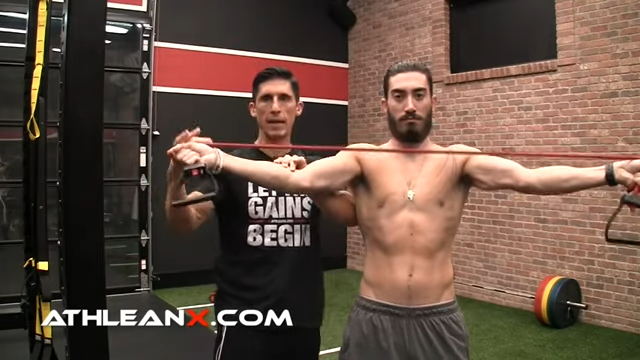
As you go to open the band up, try to also rotate externally.
Another way to think about it: As you pull the band apart, keep trying to turn your thumbs back. Don’t just keep them pointed up to the ceiling. Instead, keep pushing them back. Rotate the hands out and keep the thumbs going back.
Above all, do not shrug during this move. If you shrug as you go – which a lot of people do – you’re literally defeating the purpose of what you’re trying to do in this exercise.

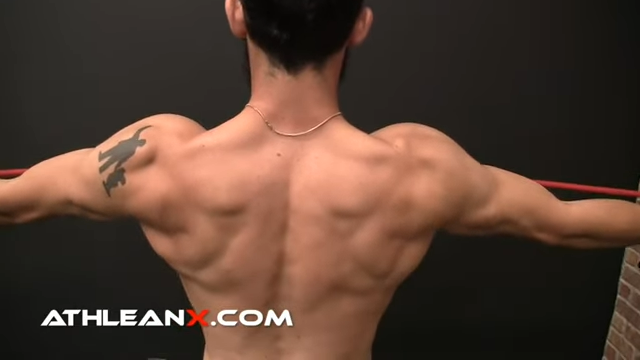
Keep the shoulders down, and then pull apart, externally rotating the thumbs and squeezing the scaps as hard as you can until the thumbs are all the way back behind you.
Your rep scheme should always be 20 sets of 1, rather than 1 set of 20 because quality is what matters.
The problem is your muscles. They’re there, they’re just not firing right. So, if we can get them to fire right, we’re much better off.
Now, let’s work on the serratus.
BANDED SERRATUS EXERCISE
Next, we want to work on the lower traps.

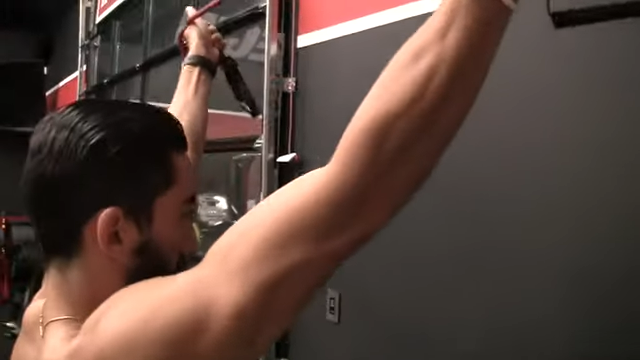
That means you need to get the arms up over your head, and you can do it with the band.
First, stand up nice and tall. From here, protract your arms forward a bit. Maintaining the tall posture and protracted arms, and turn the arms out into external rotation. Begin to pull the band apart until you have good tension on the band then raise it up overhead. Pause at the top, slowly come down, and repeat.
Remember that you need to focus on quality reps here. Every single rep is going to be the key for correcting this muscle imbalance.
HOW TO FIX ROUNDED SHOULDERS: HABITS
Lastly, we’ve got to talk about poor posture habits because remember that you didn’t’ get this way in one day.
I’m sure as a kid you didn’t walk around like this all the time. You probably walked around with good head posture and had a healthy movement pattern.
You just did things to yourself over the years that put you in that position.
You need some sort of feedback.
I’ll give you two cues… one thing for standing – because we’re going to spend half the day standing – and one thing for sitting down.
TENNIS BALL BEHIND YOU
When you’re sitting, all you have to do is take a tennis ball and put it behind your shoulder blades, right against the back of the chair.

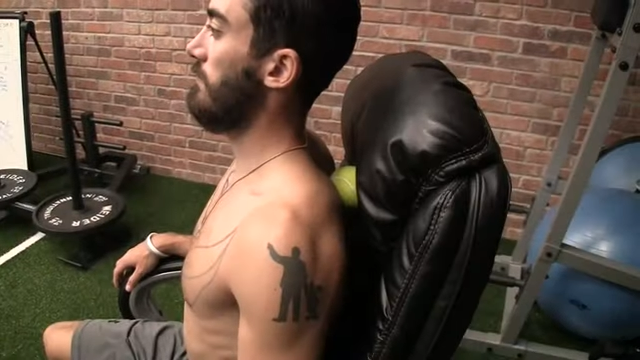
You’ll find that the second you start to fall into that rounded shoulder posture, the tennis ball is going to drop behind you in the chair. This provides instant feedback that you did something wrong with your posture.
When you sit upright, and you put the tennis ball back there it’s going to force you to be in a better position.
WHERE IS YOUR STERNUM?
The next tip is for when you’re walking around. I always ask myself one thing, “Where is your sternum?” You need to focus on where the top of the sternum is as you’re walking.

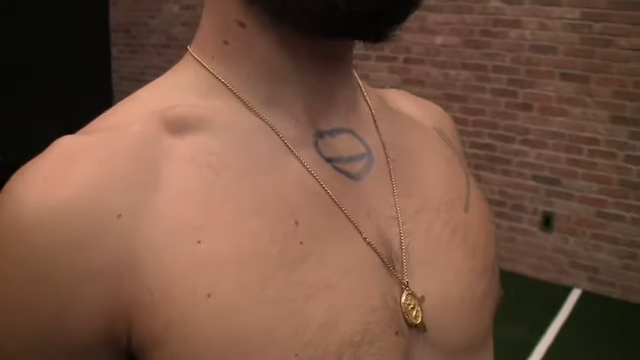
If the top of it is angling down then you’re in for some trouble because if it is, everything is coming with it.
What you want to do is try to lift your sternum. Pretend that the top of your sternum – at the top of your chest bone – has a glass of water on top of it. If you’re letting the glass tip over because you have hunched shoulders, then you know that you’re in a bad position.
Always keep your sternum up throughout the day and avoid that hunchback posture. You can check that throughout the day just by trying to consciously ask yourself, “Where is my sternum?” And you’ll instantly know if it’s down you’re tilting that water.
If it’s up, the cup is level, you’re in a good spot.
GET UP, GET MOVING
If you spend a lot of time behind your desk, it’s important to get up a few times during the day. Every 15 to 30 minutes, just stand up for a little bit.
It gives you a break from that position, and it gives you the reminder that you should be checking the position of your sternum and remembering to place the ball behind your back when you sit back down.
The fact is, bad habits will take some time to break. If you can spend about five minutes doing a handful of exercises, stretches, and some mobility work, then you’ll see huge improvements.
You can easily fit these into your current exercise program. Doing it consistently is going to pay off in the long run, and I guarantee you, you’re going to be able to fix this.
If you’re lifting and training, you want to build off a solid foundation.
If you’re trying to lift with a bad foundation of poor posture and rounded shoulders, you’re in for some trouble.
So, fix the foundation first, and everything else will fall into place.
If you’re looking for a well rounded training program that will help you fix muscle imbalances and posture issues, check out our ATHLEAN-X programs to see which one best fits your needs.

- Rounded shoulders are one of the most common postural problems that not only makes us look bad when standing but it compromises our bodies over time.
- We start with the joint correction, but not the shoulder joint as you might think. Tightness and restriction in the mid back (thoracic spine) can actually cause problems that lead to shoulder rounding.
- One exercise to fix these issues is the Rolling Chest Stretch. Lie face down on the floor and extend your arms up over your head at a 45-degree angle. Roll backwards to one side and let your arms stay high.
- Next, we have to deal with tight muscles. Muscles involved in causing rounded shoulders are either tight or weak. You can perform two stretches that don’t require equipment. All you need is a doorway to position your body in and you are good to go.
- Next, you need to strengthen the correct muscles as well. You can do this with a variety of exercises but two in particular: the upgraded band pull apart and the banded serratus exercise. The focus here should not be on doing lots of reps but rather fewer quality reps.
- Finally, it’s all about setting good habits so that you can make sure good posture is a natural habit you do every day. You can use a tennis ball behind you while sitting to keep your posture in check. While walking, you can imagine you need to keep a glass of water from falling off the top of your sternum.
- The key is going to be to be consistent with it. Just a few times per week and 4 steps is all you need to start making the rounded shoulders you now have a distant memory.

Jeff Cavaliere M.S.P.T, CSCS
Jeff Cavaliere is a Physical Therapist, Strength Coach and creator of the ATHLEAN-X Training Programs and ATHLEAN-Rx Supplements. He has a Masters in Physical Therapy (MSPT) and has worked as Head Physical Therapist for the New York Mets, as well as training many elite professional athletes in Major League Baseball, NFL, MMA and professional wrestling. His programs produce “next level” achievements in muscle size, strength and performance for professional athletes and anyone looking to build a muscular athletic physique.
